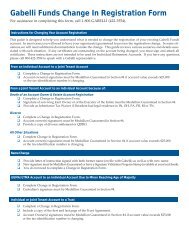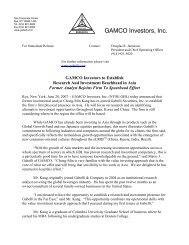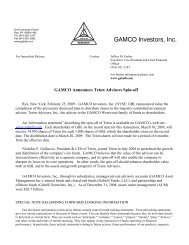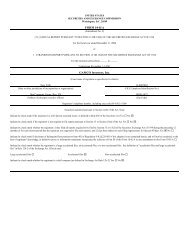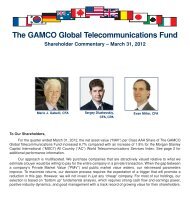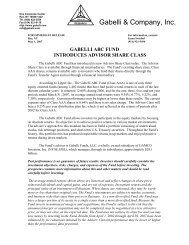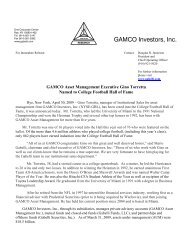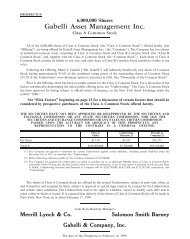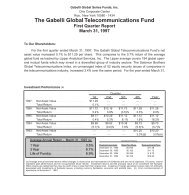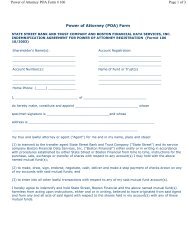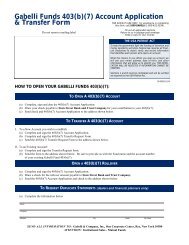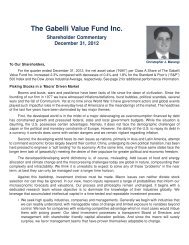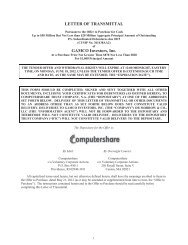Statement of Additional Info - Gabelli
Statement of Additional Info - Gabelli
Statement of Additional Info - Gabelli
Create successful ePaper yourself
Turn your PDF publications into a flip-book with our unique Google optimized e-Paper software.
A Fund may also buy variable rate master demand notes. The terms <strong>of</strong> these obligations permit a Fund to invest<br />
fluctuating amounts at varying rates <strong>of</strong> interest pursuant to direct arrangements between the Fund, as lender, and the<br />
borrower. These instruments permit weekly and, in some instances, daily changes in the amounts borrowed. The Fund<br />
has the right to increase the amount under the note at any time up to the full amount provided by the note agreement, or to<br />
decrease the amount, and the borrower may repay up to the full amount <strong>of</strong> the note without penalty. The notes may or<br />
may not be backed by bank letters <strong>of</strong> credit. Because the notes are direct lending arrangements between a Fund and<br />
borrower, it is not generally contemplated that they will be traded, and there is no secondary market for them, although<br />
they are redeemable (and, thus, immediately repayable by the borrower) at the principal amount, plus accrued interest, at<br />
any time. In connection with any such purchase and on an ongoing basis, the Adviser will consider the earning power,<br />
cash flow, and other liquidity ratios <strong>of</strong> the issuer, and its ability to pay principal and interest on demand, including a<br />
situation in which all holders <strong>of</strong> such notes make demand simultaneously. While master demand notes, as such, are not<br />
typically rated by credit rating agencies, a Fund may, under its minimum rating standards, invest in them only if, at the<br />
time <strong>of</strong> an investment, the issuer meets the criteria set forth in this SAI for commercial paper obligations.<br />
When-Issued or Delayed-Delivery Securities (All Funds). New issues <strong>of</strong> fixed-income securities usually are <strong>of</strong>fered<br />
on a when-issued or delayed-delivery basis, which means that delivery and payment for such securities ordinarily take<br />
place within 45 days after the date <strong>of</strong> the commitment to purchase. The payment obligation and the interest rate that will<br />
be received on such securities are fixed at the time the Fund enters into the commitment. The Fund will make<br />
commitments to purchase such securities only with the intention <strong>of</strong> actually acquiring the securities, but the Fund may sell<br />
these securities before the settlement date if it is deemed advisable. The Fund will not accrue income in respect <strong>of</strong> a<br />
when-issued or delayed-delivery security prior to its stated delivery date. No additional when-issued commitments will<br />
be made if more than 20% <strong>of</strong> a Fund's net assets would be so committed.<br />
Securities purchased on a when-issued or delayed-delivery basis and certain other securities held in a Fund's portfolio are<br />
subject to changes in value (both generally changing in the same way, i.e., appreciating when interest rates decline and<br />
depreciating when interest rates rise) based on the public's perception <strong>of</strong> the creditworthiness <strong>of</strong> the issuer and changes,<br />
real or anticipated, in the level <strong>of</strong> interest rates. Securities purchased on a when-issued or delayed-delivery basis may<br />
expose a Fund to the risk that such fluctuations will occur prior to their actual delivery. Purchasing securities on a whenissued<br />
or delayed-delivery basis can involve an additional risk that the yield available in the market when the delivery<br />
takes place actually may be higher than that obtained in the transaction itself. When a Fund purchases securities on a<br />
forward commitment, when issued, or delayed delivery basis it does not pay for the securities until they are received, and<br />
the Fund will “earmark” on the records <strong>of</strong> the Adviser or place in a segregated account with the Fund’s custodian, cash or<br />
other liquid securities in an amount equal to or greater than, on a daily basis, the amount <strong>of</strong> the Fund’s forward<br />
commitments, when issued or delayed delivery commitments, or to enter into <strong>of</strong>fsetting contracts for the forward sale <strong>of</strong><br />
other securities it owns. Purchasing securities on a when-issued or forward commitment basis when the Fund is fully or<br />
almost fully invested may result in greater potential fluctuations in the value <strong>of</strong> the Fund’s net assets and its NAV.<br />
Foreign Securities (All Funds). Each Fund may invest directly in both sponsored and unsponsored U.S. dollar- or<br />
foreign currency-denominated corporate debt securities, certificates <strong>of</strong> deposit, and bankers' acceptances issued by<br />
foreign banks, and obligations <strong>of</strong> foreign governments or their subdivisions, agencies, and instrumentalities, international<br />
agencies and supranational entities. Each <strong>of</strong> the Mighty Mites Fund, SmallCap Equity Fund, Income Fund, Equity Fund<br />
and Balanced Fund, may invest up to 25% <strong>of</strong> their respective total assets directly in foreign equity securities and in<br />
securities represented by European Depositary Receipts (“EDRs”) or American Depositary Receipts (“ADRs”). The<br />
Mid-Cap Equity Fund may invest up to 35% <strong>of</strong> its total assets in foreign securities; such limitation not including ADRs,<br />
securities <strong>of</strong> a foreign issuer with a class <strong>of</strong> securities registered with the Securities and Exchange Commission (“SEC”)<br />
and listed on a U.S. national securities exchange, and dollar-dominated securities publicly <strong>of</strong>fered in the U.S. by a foreign<br />
issuer. ADRs are dollar-denominated receipts generally issued by domestic banks, which represent the deposit <strong>of</strong> a<br />
security <strong>of</strong> a foreign issuer with a bank, and which are publicly traded on exchanges or over-the-counter in the United<br />
States. EDRs are receipts similar to ADRs and are issued and traded in Europe. The Intermediate Bond Fund does not<br />
expect to invest more than 25% <strong>of</strong> its assets in securities <strong>of</strong> foreign issuers.<br />
Thus, investment in shares <strong>of</strong> the Funds should be made with an understanding <strong>of</strong> the risks inherent in an investment in<br />
foreign securities either directly or in the form <strong>of</strong> ADRs or EDRs, including risks associated with government, economic,<br />
monetary, and fiscal policies, possible foreign withholding taxes, inflation, and interest rates, economic expansion or<br />
contraction, and global or regional political, economic, or banking crises. Investment in obligations <strong>of</strong> foreign issuers<br />
and in direct obligations <strong>of</strong> foreign nations involves somewhat different investment risks than those affecting obligations<br />
<strong>of</strong> United States domestic issuers. Foreign issuers are not necessarily subject to uniform accounting, auditing and<br />
financial reporting standards, practices, and requirements comparable to those applicable to domestic issuers. In<br />
7



